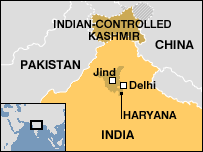India's Haryana state utilities to buy electricity from 21 biomass projects worth US$ 745 million
 Taking a big leap forward into the renewable energy sector, the Haryana Renewable Energy Development Agency (HAREDA) signed Memoranda of Understanding (MoU) on power purchasing agreements with seven independent power producers (IPPs) to buy a large amount of renewable electricity.
Taking a big leap forward into the renewable energy sector, the Haryana Renewable Energy Development Agency (HAREDA) signed Memoranda of Understanding (MoU) on power purchasing agreements with seven independent power producers (IPPs) to buy a large amount of renewable electricity.The initiative will result in the generation of 686MW of power through 21 biomass power plants and four wind energy projects at a total cost of 33 billion rupiah (€570/US$745 million).
The State of Haryana is located in India's North-Western region and has a population of some 21 million inhabitants. It is the first state in the country to have achieved 100% electrification, reaching all villages. The average Haryana inhabitant consumes around 550kWh of electricity per year (compare this to the US average of 13,250kWh per person per year).
HAREDA recently analysed the power generation potential through renewables and found the following results:
- Biomass: 1400 MW
- Bagasse Cogeneration (bagasse is residual sugar cane biomass): 100 – 150 MW
- Small Hydro Projects: 45 MW
- Municipal Solid Waste: 17 MW
- Solar Energy: 5.5 - 6.5MW
- Wind Energy: being mapped
 bioenergy :: biofuels :: energy :: sustainability :: renewables :: bagasse :: cogeneration :: biomass :: Haryana :: India ::
bioenergy :: biofuels :: energy :: sustainability :: renewables :: bagasse :: cogeneration :: biomass :: Haryana :: India :: The policy is aimed at promoting generation of electricity through renewable energy sources. Chief Minister Bhupinder Singh Hooda says this would be the future of energy generation for the state, adding that only the speedy setting up of these projects with a time lag of 20 moths after signing the Power Purchase Agreement for biomass projects and 26 months for wind projects, the people, the producers and the Government would be benefited, he added.
Earlier, in his presentation, Financial Commissioner and Principal Secretary, Renewable Energy Department, Mr. S.C.Chaudhary informed that the biomass based power projects would generate 246 MW of power and the wind energy based power projects would produce 440 MW power and these would start generation of power by the mid of 2009.
The director of the Haryana Renewable Energy Department and of HAREDA, Sumita Misra signed the MoU's for biomass power projects M/s Starwire India Ltd., New Delhi, M/s Gammon India Ltd., Mumbai, M/s Tecpro Energy Pvt. Ltd. Chennai, M/s Jyoti Biomass Power Ltd., Hyderabad and M/s Turboatom -TPS Projects Ltd., New Delhi. Similarly, in case of setting up of wind energy based power projects, the MoUs were signed with two IPPs including, M/s Suzlon Energy Ltd., Pune and M/s. Enercon India Ltd., Mumbai.
Misra said that the power generated by these projects would be purchased by the Power Utilities on the tariff decided by the Haryana Electricity Regulatory Commission as per provisions in the Electricity Act, 2003. The Commission has already fixed the tentative tariff and had invited comments from the stake holders for finalising the tariff. She said that these renewable energy projects would not only be environment friendly, but these would also help in reducing the power cuts during the peak hours. As these power generation projects would be located near the load centres, these would help in reducing the transmission losses.
More information:
HAREDA: Consultation Paper for fixation of Tariff for RE Power Projects [*.pdf].
 -------------------
-------------------
 Spanish company Ferry Group is to invest €42/US$55.2 million in a project for the production of biomass fuel pellets in Bulgaria.
The 3-year project consists of establishing plantations of paulownia trees near the city of Tran. Paulownia is a fast-growing tree used for the commercial production of fuel pellets.
Spanish company Ferry Group is to invest €42/US$55.2 million in a project for the production of biomass fuel pellets in Bulgaria.
The 3-year project consists of establishing plantations of paulownia trees near the city of Tran. Paulownia is a fast-growing tree used for the commercial production of fuel pellets.









0 Comments:
Post a Comment
Links to this post:
Create a Link
<< Home